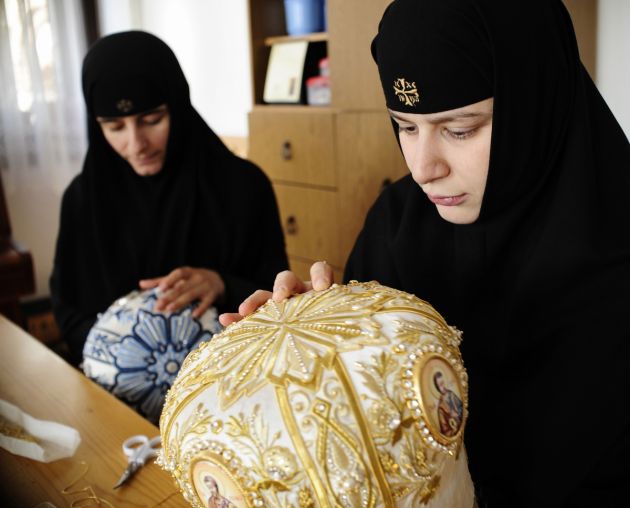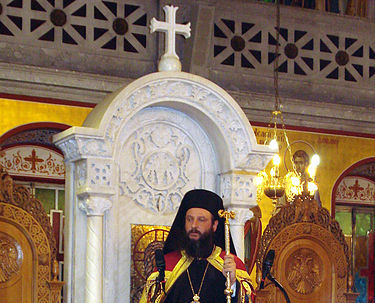Macedonia under fire for jailed Serbian archbishop

International church and human rights bodies are calling on the government of Macedonia to release a Serbian Orthodox archbishop from jail.
They believe the charges against the bishop are not based in fact, but on an ecclesiastical dispute with the breakaway Macedonian Orthodox Church (MOC).
Since 2003 Archbishop Jovan of Ohrid has been imprisoned six times, according to the Belgrade-based human rights organization Center 9.
In 2005 Amnesty International deemed him a "prisoner of conscience."
The archbishop is currently in jail serving a three-year prison sentence for embezzling a quarter of a million euro.
The sentence was handed down by a Macedonian court in early July.
About half the size of Switzerland with a population of just over two million people, the official name of the country is the Republic of Macedonia.
It was part of the former Yugoslavia, from which it declared independence in 1991.
It became a member of the United Nations in 1993 but, as a result of a dispute with Greece over its name, it was admitted under the provisional name of the former Yugoslav Republic of Macedonia, sometimes abbreviated as FYROM.
Archbishop Jovan has served 18 months in prison already on embezzlement charges, and may have to remain in jail until the end of next year.

The archbishop was arrested as he entered Macedonia from Greece in December, 2012.
In addition to the prison term, Archbishop Jovan was ordered to turn over property belonging to the Serbian Orthodox Church, including buildings.
Also convicted with Archbishop Jovan were 14 priests, monks and nuns, as well as his mother and sister. They were all given suspended sentences.
The general secretary of Center 9, Drasko Djenovic, said Archbishop Jovan's imprisonment was politically based, reported BosNewsLife, a site which documents Christian persecution.
He noted that the prelate was involved in an effort to bring the MOC back under the fold of the SOC.
Djenovic told BosNewsLife of the nature of some of the charges filed in the past against the 47-year old archbishop.
"Once he was in prison because he baptized a child and another time because of having a prayer service in a private home," Djenovic said.
Last year tensions between the two church bodies grew when the Macedonian authorities detained 19 Serbian Orthodox monks, nuns and other believers, according to BosLifeNews. Their passports were also taken away.
Although they were released, Archbishop Jovan remained in jail.
The argument between the SOC and the MOC dates back to the communist era of Eastern Europe, when both countries were part of Yugoslavia, according to The Economist magazine.
The magazine said in a July posting on its Erasmus blog, a site dealing with the intersection of public policy and religion that "the party bosses agreed in 1967 that it would be a good idea if the republic of Macedonia had its own Orthodox church, instead of being part of the Serbian one."
The Economist noted that the MOC has never been recognized by the SOC or the global Orthodox Church.
In 2002, a meeting of bishops from the two bodies reached agreement to reunite under the SOC banner. However, most of the MOC leadership soon rejected the agreement.
On the other hand, Archbishop Jovan remained committed to the rapprochement and is recognized as the legitimate head of the Macedonian Orthodox Church by worldwide Orthodoxy.
The World Council of Churches (WCC) has said that he is a victim of persecution, according to The Economist. The magazine also noted that the Conference of European Churches has called for his release from custody and for a fair trial.
The Erasmus blog said that the procedures of Archbishop Jovan's latest trial cast doubt on the court.
Voislav Stojanovski, a Macedonian lawyer who observed the proceedings for the Helsinki Committee, a human rights group, told the Erasmus blogger (who is unidentified) that three judges left the court to confer at a time when a last-minute witness testified against the prelate.
They returned and denied a request from the archbishop's lawyer to see evidence mentioned by the witness.
"None of that proves that the verdict was a miscarriage of justice. But it does look distinctly fishy," wrote the Erasmus blog author.
The SOC has issued an international appeal for assistance in obtaining the release of Archbishop Jovan.